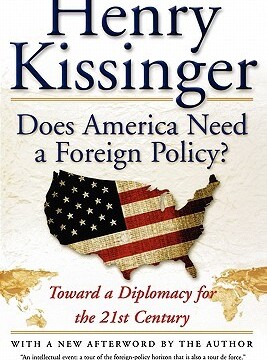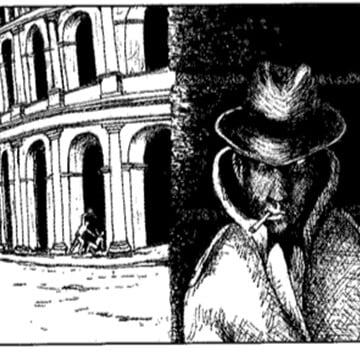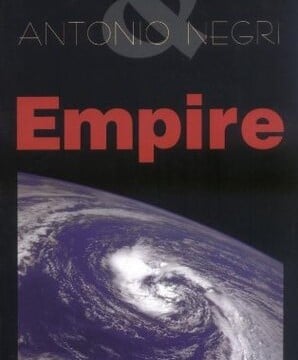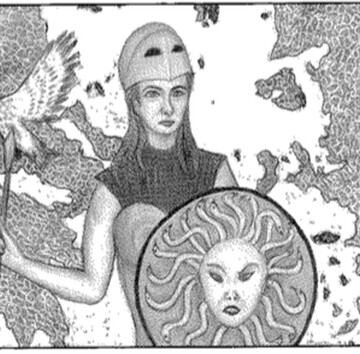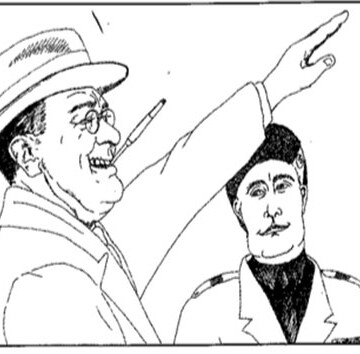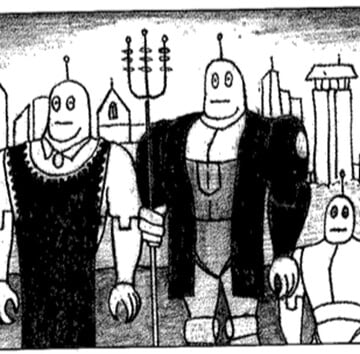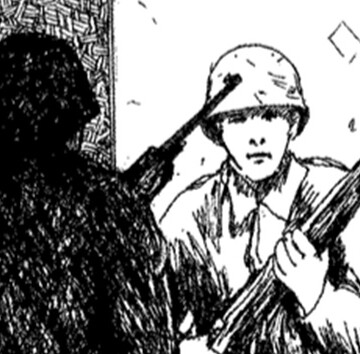On June 24, President George W. Bush delivered his long-awaited speech on the Middle East. Most of his 15-minute statement was devoted to harsh criticism of the Palestinians, including the assertion that “peace requires a new and different Palestinian leadership . . . not compromised by terrorism.” In addition to ditching Yasser Arafat and ending...
Author: Srdja Trifkovic (Srdja Trifkovic)
Foiling a Terrorist Plot
U.S. Intelligence claims to have foiled an Al Qaeda plot to explode a radioactive “dirty bomb” in an American city. Abdullah al-Muhajir, a 31-year-old American-born U.S. citizen of Latin American origin, made the mistake of traveling to Chicago’s O’Hare International Airport from Pakistan after concluding his terrorist training. Had he taken the trouble to travel...
Transatlantic Rifts
In the immediate aftermath of September 11, Europe was closer to America, politically and emotionally, than at any time since World War II. For a moment, the threat of Islamic terrorism had rekindled a dormant awareness on both sides of the Atlantic of just how much the Old Continent and the New World have in...
In Memoriam: Gen. Alexander Lebed, 1950-2002
When I first met General Alexander Lebed, shortly after he was forced to retire from his military career in 1995, he was a crusty soldier with great political ambitions, itching for action but visibly uncomfortable in mufti. His tie knot was too wide and his parade-ground bass sounded coarse and unmodulated. His face, with more...
Tapping into Concerns
Jean-Marie Le Pen’s success in the first round of France’s presidential election—he came in second and faced President Jacques Chirac in the final round-fell far short of a “revolution,” despite the right’s wishful thinking. The number of votes in his favor has risen only slightly since 1995, and the rout of the Socialists was primarily...
Milosevic on Trial
There are contests in which a decent person prefers not to take sides, such as the bloody wars between Mafia families or Stalin’s disputes with Trotsky and Tito. The war between Khomeini’s Iran and Saddam’s Iraq also comes to mind, or the family feud between Pol Pot and the Vietnamese communists. It is tempting to...
State of the Union: An Empire, Not a Republic
President Bush’s recent State of the Union Address was an historic occasion. His speechwriting staff went through nearly 30 drafts and finally presented him (and the rest of us) with a mature ideological framework that reflects the balance of outlooks within the present administration. The preceding debate may have been the last chance for any...
We Are the World
In the aftermath of September 11, the chairman of the House International Relations Committee noted that the war on terrorism has revealed the need to overhaul U.S. foreign policy. “Can anyone doubt that the sum of our efforts has been insufficient?” asked Rep. Henry Hyde (R-IL) on October 10, opening a hearing into the role...
Time for Arafat to Go
It is not necessarily a bad thing for a national leader to remain at the helm for a very long time, provided that he is successful. Otto von Bismarck’s 28 years as Prussia’s and then the Reich’s chief minister were marked by unification and consolidation internally, nifty diplomacy and overall stability of the European balance-of-power...
Afghanistan and Oil
Writing in the New York Times on September 26, Paul Krugman insisted that the war against Afghanistan would not be “a war on behalf of the oil companies; not even a war on behalf of SUVs and McMansions.” It was, though, going to be a war “over a natural resource that is more vital than...
Osama bin Laden: The Balkan Connection
The U.S. and British embassies were shut down in Sarajevo on October 17 after receiving threats from Bosnian Muslims and their foreign co-religionists resident in Bosnia who profess outrage at the bombing of Afghanistan. “This step has been taken due to a credible security threat to the official U.S. presence in Bosnia-Herzegovina” a U.S. official...
The Coming Ordeal
This latest book by the former secretary of state illustrates the difficulty of separating a piece of writing from its creator (Alan Greenspan on macroeconomics, Bill Gates on information technology, Steven Spielberg on cinematography. Would a similar, slim volume attract national attention if came from an assistant professor at a Midwestern college? Would it be...
Memorandum to President George W. Bush
In the aftermath of September 11, you have done a reasonably good job managing the crisis, symbolizing the nation’s unity, restraining the laptop bombardiers, and preparing a military response that was neither hasty nor disproportionate. Now that two months have passed, you have more time to reflect on the long-term significance of that event and...
A State Visit
Vicente Fox, Mexico’s president, began his state visit to Washington in September by issuing a public challenge to President George W. Bush to grant amnesty to millions of illegal Mexican aliens in the United States by year’s end. He said he wanted a “bilateral migration agreement” that would ensure that “all Mexicans entering the United...
NATO Expansion: Harmful and Dangerous
After President Bush’s meeting with Russian President Vladimir Putin in Italy in July, it is almost certain that a new round of NATO expansion will be announced at the forthcoming summit in Prague, regardless of Moscow’s misgivings. The alliance will include Slovenia, Slovakia, the three Baltic republics, and possibly Rumania and Bulgaria. The consequences of...
National Missile Defense
National missile defense proponents and supporters of American abrogation of the 1972 Antiballistic Missile (ABM) Treaty claim that Moscow is now grudgingly reconciled to both. When Russian President Vladimir Putin and Defense Minister Sergei Ivanov irritably countered such suggestions, the Bush administration sent Defense Secretary Donald Rumsfeld on a one-day trip to Moscow on August...
Averting War With China
No foreign-policy issue facing the United States is more important than our longterm relationship with China, the most populous nation and the fourth-largest country on Earth. If we think in terms of uninterrupted statehood, China is the oldest nation-state, accustomed to taking the long view in foreign affairs. More significantly, if its present rate of...
Nation-Building
Bosnia is the United Nations’ first major experiment in nation-building, and the experiences of this multiethnic/multicultural state provide discouraging evidence that the “international community” is no more virtuous or high-minded than the old rogues who governed nation- states. Take the case of Thomas Miller, the United States ambassador in Sarajevo, who is rumored to have...
Roman Spies and Spies in Rome
In the summer of 1943, as Allied forces reached Italy, U.S. Army counterintelligence warned GIs, “You are no longer in Kansas City, San Francisco, or Ada, Oklahoma, but in a European country where espionage has been second nature to the population for centuries.” That “second nature” extends all the way back to early Rome and...
Robert Hanssen and the New Meaning of Treason
A year ago, Robert Philip Hanssen apparently felt the need to explain to the Russians his motives for supplying them with thousands of top-secret U.S. intelligence documents over the preceding decade and a half. The veteran FBI agent wrote them a letter, confessing that he is neither insanely brave, nor merely insane, but “insanely loyal”...
Sharon’s Victory and U.S. Policy in the Middle East
With the landslide victory of Ariel Sharon in the Israel general election on February 6, it is obvious that America needs to reevaluate its policy in the Middle East. A revised policy should be based on three key premises. First, Israel is a small foreign country. It is a friendly and democratic country, but by...
Talks in Belgrade
Carla del Ponte’s talks in Belgrade with President Vojislav Kostunica of Yugoslavia ended abruptly and acrimoniously on January 23. After an hour with Kostunica, an angry-looking Miss Del Ponte, the chief prosecutor of The Hague war-crimes tribunal, rushed past assembled journalists and refused to give a scheduled statement. Her “list of demands”—topped by the extradition...
Will President Bush Resist the Global Interventionists?
In the second presidential debate last October, George W. Bush warned Vice President Gore that it is not America’s role to patrol the planet and to arrange other peoples’ lives in its own image. The United States must be proud and confident of our values, he said, “but humble in how we treat nations that...
Marx, Albright, Blair & Gates
When the jacket blurb tells you that the book before you “basically combines a kojevian notion of global market as post-history (in this sense akin to Fukuyama’s eschatology) with a Foucauldian and Deleuzian notion of bio-politics (in this sense crossing the road of a Sloterdijk who also poses the question of a coming techniques of...
A Balkans Policy for the New Administration
American policies in the Balkans over the past decade have come to embody all that is wrong with the fundamental assumptions of the decisionmakers in Washington. A thorough revision of those policies would be an important step toward a more pragmatic American strategy in world affairs based on the national interest. This is no longer...
Athenian Hegemony and Its Lessons for America
Our common European civilization—of which the old American Republic is an integral part, or else it is nothing —is rooted in “the glory that was Greece.” Our spiritual and intellectual mentors are to be found among Greek thinkers, scientists, and artists. This inheritance is reflected even in the way we repeat the political follies of...
Let the Counterrevolution Begin
Two centuries after de Maistre, we still encounter Frenchmen, Italians, and Russians; as for “man,” we have yet come across him anywhere. Nations still survive, in spite of the attempts of dictatorial “Western” ruling elites to destroy them, and families, and all other communities bonded by kinship, language, faith, and myth. Those elites are united...
NATO, R.I.P.
At the European Union summit in Nice last December France initiated plans for a new European military structure. While the stated purpose of the emerging 15-member alliance is to complement NATO rather than replace it, there is growing concern in Washington that the ultimate objective of French and German strategic planners is to sever the...
The Serbs and the West
A thousand editorialists have described Vojislav Kostunica, Yugoslavia’s new president, as a “moderate nationalist.” In fact, Kostunica is no more “nationalistic” than Jacques Chirac or Vaclav Havel. He is a self-described Serbian patriot, who says he wants for his people no more—and certainly no less—than he is prepared to grant to others. That is enough...
Taking to the Streets
The Serbs, after a decade of being treated as the designated demons of Europe, were, in the first week of October, transformed by Western media and politicians into a nation of Walesas and Havels. The ethnic cleansing and mass rape stories were gone, replaced by those of freedom, democracy, and gallantry. As Matthew Parris remarked...
National Missile-Defense Deployment Postponed
On September 1, President Clinton announced that he would leave to his successor the decision on whether to move from research and development to deployment of the National Missile Defense (NMD). The announcement to shelve the NMD was long overdue. The United States came very close to spending billions of dollars—and risking a confrontation with...
Millennial Summit
President Clinton failed to restart the Middle East peace process at the United Nations’ “millennial” summit in New York in September. In meetings with Israeli Prime Minister Ehud Barak and Palestinian leader Yasser Arafat, Clinton made one final attempt to provide his presidency with a badly needed foreign policy success by brokering a deal. His...
Mexico Under New Management: Wish Them Well, and Build That Fence
Because of illegal immigration, there is no other country that affects America’s way of life as profoundly as does Mexico. Its politics should he followed, therefore, with the same attention to detail that characterized Kremlinology at the height of the Cold War. Instead, there was an air of unreality to the hundreds of American editorials...
A Genuine Centrist
Joseph Lieberman, Al Gores pick for vice president, is supposed to bring the Democratic ticket back to the center. Gore secured his presidential nomination by pandering to leftist interest groups, from radical feminists and “gays” to supporters of abortion and Sharptonite hate purveyors. But to have any chance of winning in November, he needed a...
Political Parties in Serbia
Vuk Draskovic, the leader of Serbia’s major opposition party, was slightly wounded on June 15 when gunmen opened fire through a window of his holiday home in the Montenegrin coastal town of Budva. After being treated at a nearby hospital, Draskovic immediately accused Yugoslav President Slobodan Milosevic of masterminding “an assassination attempt.” Two days later,...
The International Criminal Court: Clinton’s Frankenstein’s Monster
For years, the Clinton-Gore administration has been in the forefront of efforts to create international judicial bodies—such as the Yugoslav war-crimes “tribunal” at The Hague—that could be used as auxiliary tools of diplomatic decisionmaking in Washington. Madeleine Albright liked the façade of legality that could be invoked to justify their policies. All along, of course,...
FDR and Mussolini
Many Americans would be horrified at the thought of discussing Franklin Delano Roosevelt and Benito Mussolini as anything but moral and political antipodes: democrat versus dictator, peacemaker versus aggressive bully, good versus bad. Fifty-five years of bipartisan hagiography have placed FDR in the pantheon of American saints, roughly at number two between Abraham Lincoln and...
Peking, the White House, and Wall Street Versus Main Street
In the last week of May, the Clinton administration successfully pressed Congress into granting China permanent normal trade relations (PNTR) status as part of a recently negotiated trade pact. With that vote—the result of an unholy alliance between the GOP and the White House—American legislators have given up their annual review of Peking’s conduct, surrendering...
A Consummate Politician
Bill Clinton, many conservatives believe, is a smooth political operator. Shifty, unprincipled, and generally odious he may be, they say, but Clinton is a “consummate politician” and a master salesman. Mr. Clinton’s performance in Moscow during the first weekend in June did not confirm this view. He did not sell the National Missile Defense (NMD)...
Gore’s Foreign Policy: More of the Same, Only Worse
We have always known that a Gore presidency would continue the flawed foreign policy of the Clinton administration; but now we know that—unlikely as it may sound—things may be even worse if the Vice President wins in November. On the last day of April, Al Gore gave his first major foreign policy speech of the...
Zimbabwe in Turmoil
Zimbabwe is in turmoil, and by early- May, the existence of elaborate plans for a British-led emergency evacuation of thousands of British and other European Union nationals was confirmed by the Foreign Office in London. Zimbabwe’s Marxist president, Robert Mugabe, reiterated his pledge to redistribute white-owned farms to landless blacks, using “emergency legislation” empowering the...
The Taiwanese Election: Implications for U.S. Security
The outcome of Taiwan’s presidential election in March is potentially the most significant single event affecting American security since the fall of the Berlin Wall. Most analysts have failed to address the fundamental dilemma that Taiwan now presents for the defense strategy of the United States. The issue is fairly simple: Are our overseas commitments...
Inheriting a Mess
President Putin is inheriting a mess. After almost a decade of Boris Yeltsin, Russia is reduced to a neocolonial wreck with collapsing birthrates, moribund industry, and a fractured body politic. A narrow stratum of robber barons, who do not give a hoot for the country or its people, are busy squandering Russia’s still ample resources...
Post-Human America
Ideological assumptions that but two generations ago would have been deemed eccentric, if not utterly insane or even demonic, now rule the “mainstream.” The trouble is that normal people do not take madmen seriously enough. This works to the advantage of politicians—an inherently insane breed—and their subjects’ attitude of “they can’t be serious” allows them...
We Are Right on Foreign Affairs Because We Are Right on Everything
It is almost embarrassing to say that we are right on foreign affairs because we are right on everything else. It nevertheless has to be said, because it is true. We are right on foreign affairs because the behavior of our rulers abroad is a logical and inevitable extension of their behavior at home. Having...
Looming Large
The future of NATO looms large in the Clinton administration’s attempt to create an autonomous zone of American military presence and political influence in the Balkans that would be independent of the ups and downs of Washington’s relations with its Western European partners. By imposing its own post-Yugoslav architecture, this administration hopes to ensure that...
Serbia Degraded
“Serbia delenda est,” declared our postmodern, post-civilized rulers in the spring of 1999. Most European countries went along with the verdict. Like Muscovites in 1938, they were thankful that the nocturnal knock was not on their door, and prayed that acquiescence would absolve them of the suspicion of disloyalty. The alternative is to get Serbianized,...
Defending the West . . . Against Itself
In his article “A Just and Necessary War,” published in the New York Times on May 25, President William Jefferson Clinton summarized the case for his war against the Serbs. He elaborated on his “vision,” arguing that the bombing of Serbia was the response to “the greatest remaining threat to that vision; instability in the...
Clinton’s Acquittal
The acquittal of William Jefferson Clinton by the United States Senate is a good thing, although amidst the gloom that justifiably surrounds this fin de siècle, one is tempted to overlook the good side of the bad news. The acquittal should help dispel three dangerous illusions that still prevail among many Americans who cling to...
Split-Run Issues
Canadian magazines would be protected against the tidal wave of split-run issues of U.S. publications that has swept across the border, under legislation sponsored by Heritage Minister Sheila Copps. The cabinet in Ottawa supported her proposed Bill C-55, which will prevent American magazine publishers from selling advertising to Canadian companies if those ads are meant...


